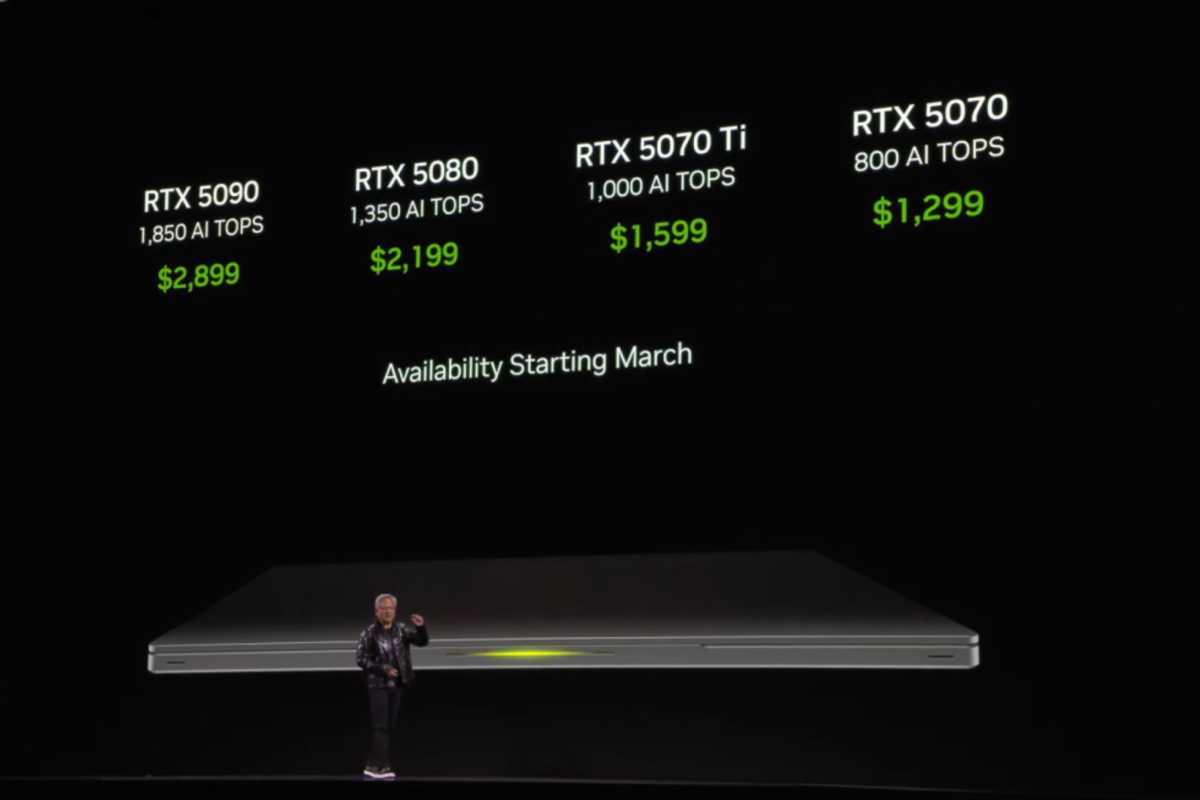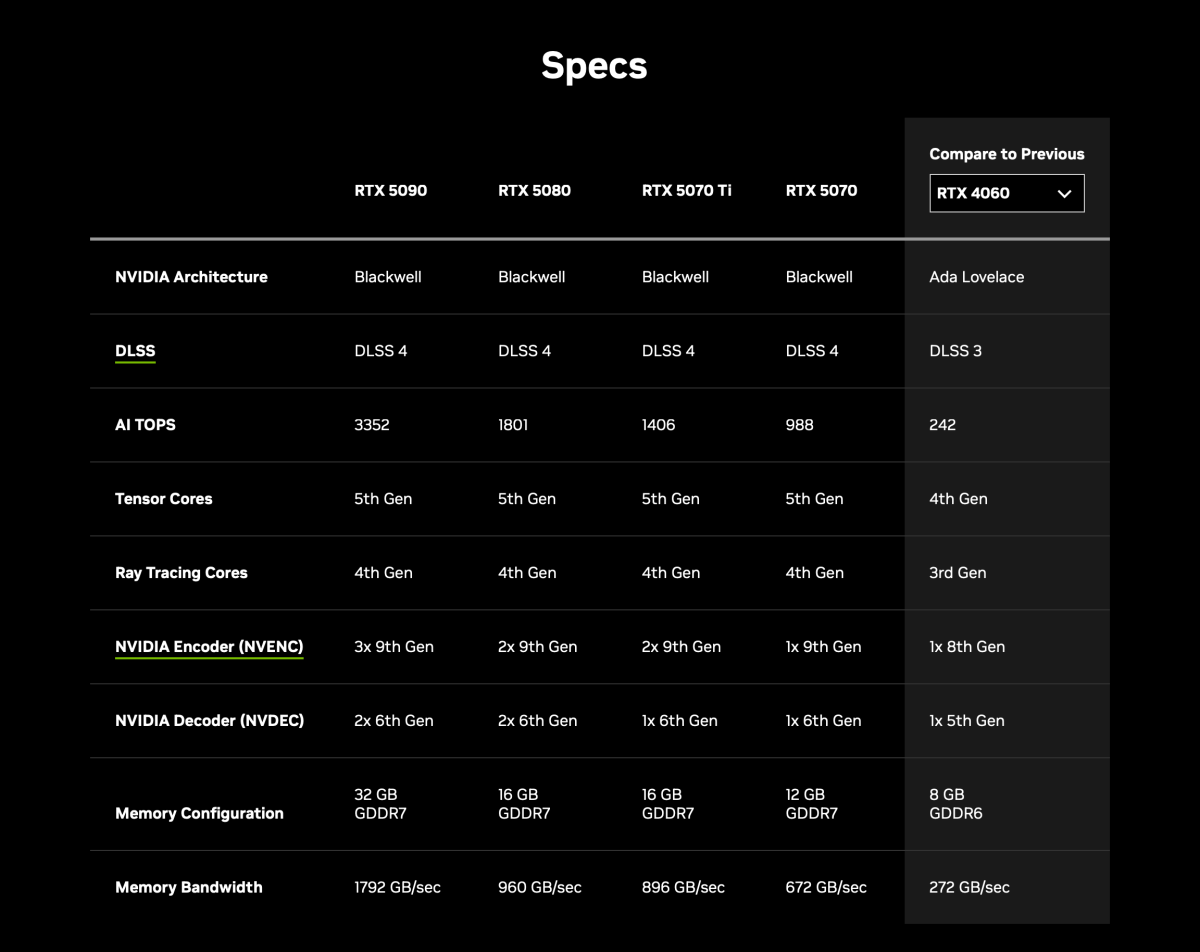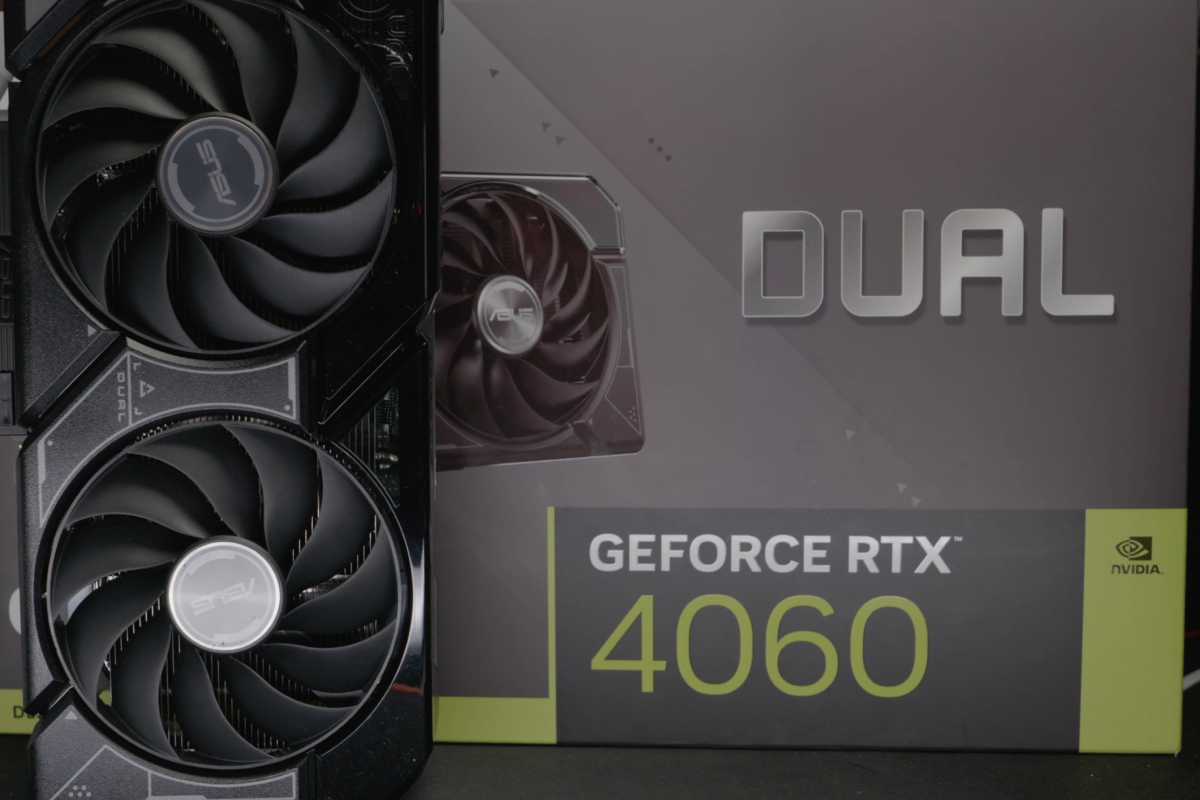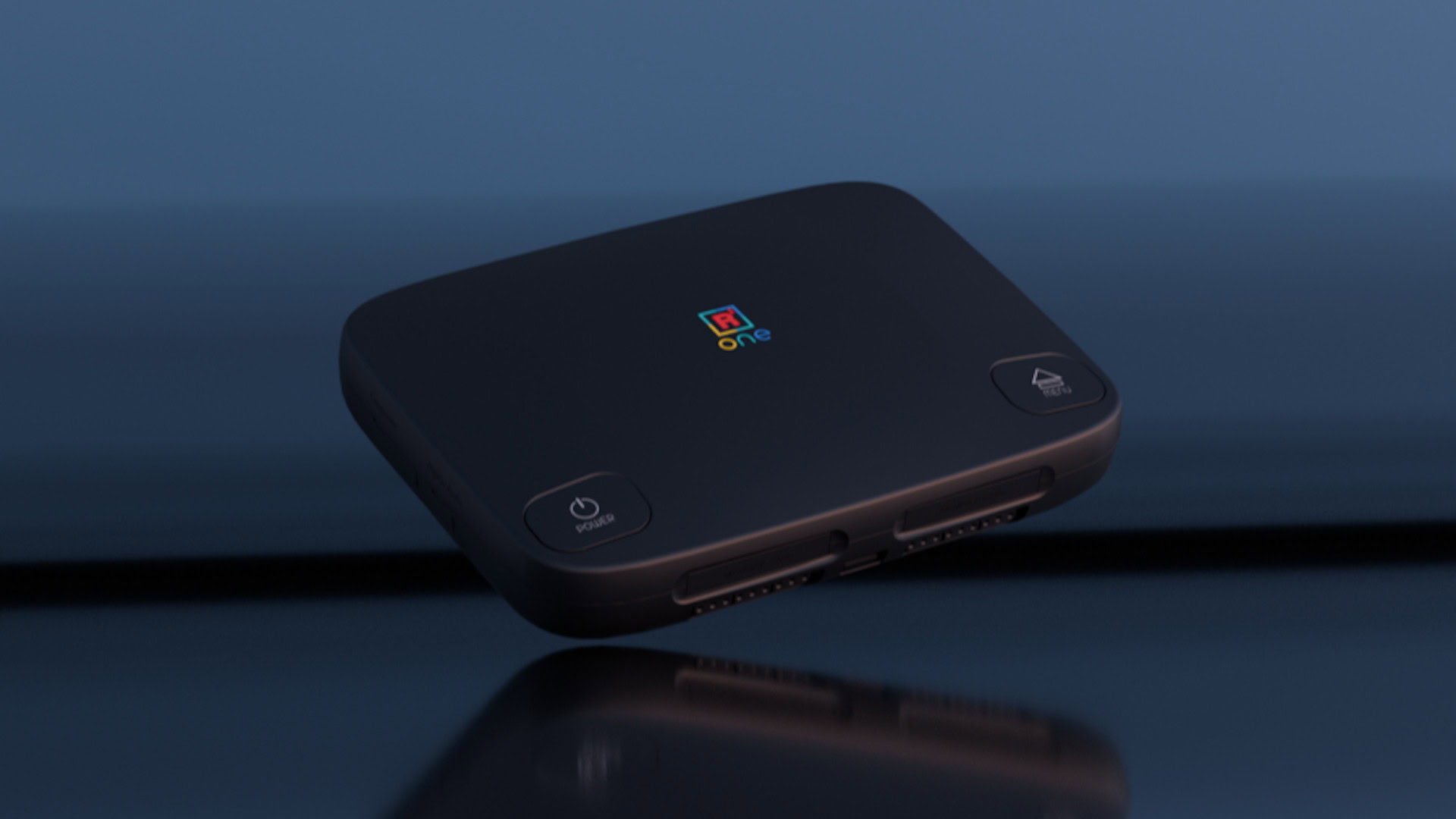Nvidia’s RTX 5070 laptops give me little hope for desktop RTX 5060s
During CES 2025, Nvidia unveiled its lineup of next-generation GeForce RTX 50 Series GPUs. While the desktop GeForce RTX 5090 garnered the most awe with its impressive specs, we also saw laptop GPUs — and these mobile GPUs might foreshadow what we can expect from the as-of-yet unannounced desktop GPUs, like the RTX 5060. The laptop GPUs come in RTX 5070, RTX 5080, RTX 5070 Ti, and RTX 5090 flavors. But the thing is, Nvidia’s laptop GPUs don’t follow the same specs as their desktop counterparts (for obvious reasons of smaller form factors and thermal headroom). As a past example, the laptop RTX 4090 only had 16GB of VRAM compared to its desktop counterpart’s 24GB. Nvidia’s lineup of RTX 50 Series laptops.Nvidia Following that trend, I see a big problem when reading the specs on the laptop GeForce RTX 5070. It’s only coming with 8GB of VRAM, and if we assume the desktop RTX 5060 will be a step down naming wise, then it’s likely to have 8GB of VRAM, too. (This is purely speculative, as we don’t know any specs or when such a GPU may even release.) The 8GB versions of the RTX 4060 and RTX 4060 Ti both faced significant backlash for their paltry VRAM. PCWorld’s Brad Chacos even pronounced that the 8GB of VRAM in the RTX 4060 Ti made it a lackluster value. It wasn’t enough back then, and it’s definitely not enough now in 2025. To see that on an RTX 5060 or Ti variant would be terrible. Gamers don’t want 8GB GPUs in 2025 Games have been pushing higher textures and ray tracing to an unprecedented degree over the last several years, and both of these tend to be VRAM-hungry even at lower resolutions like 1080p. If you’re like me, you probably push your game settings as high as you can and just hope your GPU can deal with it. But with only 8GB of VRAM in 2025, that’s an increasingly hard ask. When testing out GeForce RTX 40 Series laptops, I found that some games looked vastly different depending on what textures were loaded on VRAM. For example, Hogwarts Legacy looked great on a mobile RTX 4090 with 16GB VRAM but noticeably different on an 8GB laptop GPU. Even on similar lower settings on both machines — settings that the 8GB GPU should’ve been able to handle — textures were lacking. GeForce RTX 50 Series specs compared to an RTX 4060.Nvidia The RTX 5070 laptop’s 8GB of VRAM was justified by Nvidia CEO Jensen Huang as an attempt to “reach a balance.” In a laptop, that balance rests between price, thermals, and power draw; for a desktop GPU, balance means cost and product segmentation. But is it worth paying less for a GPU if it means getting only 8GB of VRAM? No, if you ask me. Any serious gaming machine needs at least 12GB of VRAM in 2025. What could Nvidia do to lessen the sting? To be fair, the potential 8GB of VRAM in an RTX 5060 would certainly have help from Nvidia’s new hardware and technologies. There’s the new Blackwell architecture and its upgraded ray tracing (RT) cores and newer generation tensor cores, plus GDDR7 memory, if Nvidia includes that with the RTX 5060. These combine with technologies like DLSS 4 with Multi Frame Generation to help games perform better. Yet, while these are great technologies that harness the power of AI to maximize performance, they still don’t make up for a lack of VRAM. Nvidia will have to do something to minimize the negative impact on gamer mind share that’ll be brought by an 8GB RTX 5060 or 5060 Ti. One thing Nvidia could do, if there is an RTX 5060 Ti, is to release one with 16GB of VRAM off the bat. This is an odd amount of RAM for this class of GPU, especially considering the RTX 5070 only has 12GB. But it’s not unprecedented. Nvidia did this very thing with the RTX 4060 Ti 16GB variant despite the RTX 4070 at 12GB. Thiago Trevisan / IDG Okay, but what about the base RTX 5060? I don’t really see a plausible scenario where Nvidia bumps it up to 12GB, but there are a few possibilities that could minimize the sting. Look at the GeForce RTX 50 Series lineup and you’ll see price drops on various models. The RTX 5070 is now $549 ($50 cheaper than the $599 RTX 4070 Super). Likewise, the RTX 5070 Ti is now $749 ($50 cheaper than the RTX 4070 Ti Super). If Nvidia could somehow lower the entry price of the RTX 5060 further, I could see how that class of GPU could at least be a reasonable consideration for many. While $249 might be aggressive, even $279 should appease some. This wouldn’t negate the fact that 8GB of VRAM is still insufficient for many modern games, but hopefully it’ll be somewhat acceptable with DLSS 4 in tow. This would certainly help strike the “balance” that Nvidia CEO Jensen Huang mentioned, with a more balanced price to offset the 8GB of VRAM. Still, 8GB will leave that part of the market wide open for AMD to swing in and capture market share — if it can provide more 12GB and 16GB GPUs at reasonable price-to-performance. Only time will tell what happens, bu

During CES 2025, Nvidia unveiled its lineup of next-generation GeForce RTX 50 Series GPUs. While the desktop GeForce RTX 5090 garnered the most awe with its impressive specs, we also saw laptop GPUs — and these mobile GPUs might foreshadow what we can expect from the as-of-yet unannounced desktop GPUs, like the RTX 5060.
The laptop GPUs come in RTX 5070, RTX 5080, RTX 5070 Ti, and RTX 5090 flavors. But the thing is, Nvidia’s laptop GPUs don’t follow the same specs as their desktop counterparts (for obvious reasons of smaller form factors and thermal headroom). As a past example, the laptop RTX 4090 only had 16GB of VRAM compared to its desktop counterpart’s 24GB.

Nvidia
Following that trend, I see a big problem when reading the specs on the laptop GeForce RTX 5070. It’s only coming with 8GB of VRAM, and if we assume the desktop RTX 5060 will be a step down naming wise, then it’s likely to have 8GB of VRAM, too. (This is purely speculative, as we don’t know any specs or when such a GPU may even release.)
The 8GB versions of the RTX 4060 and RTX 4060 Ti both faced significant backlash for their paltry VRAM. PCWorld’s Brad Chacos even pronounced that the 8GB of VRAM in the RTX 4060 Ti made it a lackluster value. It wasn’t enough back then, and it’s definitely not enough now in 2025. To see that on an RTX 5060 or Ti variant would be terrible.
Gamers don’t want 8GB GPUs in 2025
Games have been pushing higher textures and ray tracing to an unprecedented degree over the last several years, and both of these tend to be VRAM-hungry even at lower resolutions like 1080p. If you’re like me, you probably push your game settings as high as you can and just hope your GPU can deal with it. But with only 8GB of VRAM in 2025, that’s an increasingly hard ask.
When testing out GeForce RTX 40 Series laptops, I found that some games looked vastly different depending on what textures were loaded on VRAM. For example, Hogwarts Legacy looked great on a mobile RTX 4090 with 16GB VRAM but noticeably different on an 8GB laptop GPU. Even on similar lower settings on both machines — settings that the 8GB GPU should’ve been able to handle — textures were lacking.

Nvidia
The RTX 5070 laptop’s 8GB of VRAM was justified by Nvidia CEO Jensen Huang as an attempt to “reach a balance.” In a laptop, that balance rests between price, thermals, and power draw; for a desktop GPU, balance means cost and product segmentation. But is it worth paying less for a GPU if it means getting only 8GB of VRAM? No, if you ask me. Any serious gaming machine needs at least 12GB of VRAM in 2025.
What could Nvidia do to lessen the sting?
To be fair, the potential 8GB of VRAM in an RTX 5060 would certainly have help from Nvidia’s new hardware and technologies. There’s the new Blackwell architecture and its upgraded ray tracing (RT) cores and newer generation tensor cores, plus GDDR7 memory, if Nvidia includes that with the RTX 5060. These combine with technologies like DLSS 4 with Multi Frame Generation to help games perform better.
Yet, while these are great technologies that harness the power of AI to maximize performance, they still don’t make up for a lack of VRAM. Nvidia will have to do something to minimize the negative impact on gamer mind share that’ll be brought by an 8GB RTX 5060 or 5060 Ti.
One thing Nvidia could do, if there is an RTX 5060 Ti, is to release one with 16GB of VRAM off the bat. This is an odd amount of RAM for this class of GPU, especially considering the RTX 5070 only has 12GB. But it’s not unprecedented. Nvidia did this very thing with the RTX 4060 Ti 16GB variant despite the RTX 4070 at 12GB.

Thiago Trevisan / IDG
Okay, but what about the base RTX 5060? I don’t really see a plausible scenario where Nvidia bumps it up to 12GB, but there are a few possibilities that could minimize the sting.
Look at the GeForce RTX 50 Series lineup and you’ll see price drops on various models. The RTX 5070 is now $549 ($50 cheaper than the $599 RTX 4070 Super). Likewise, the RTX 5070 Ti is now $749 ($50 cheaper than the RTX 4070 Ti Super). If Nvidia could somehow lower the entry price of the RTX 5060 further, I could see how that class of GPU could at least be a reasonable consideration for many. While $249 might be aggressive, even $279 should appease some. This wouldn’t negate the fact that 8GB of VRAM is still insufficient for many modern games, but hopefully it’ll be somewhat acceptable with DLSS 4 in tow.
This would certainly help strike the “balance” that Nvidia CEO Jensen Huang mentioned, with a more balanced price to offset the 8GB of VRAM. Still, 8GB will leave that part of the market wide open for AMD to swing in and capture market share — if it can provide more 12GB and 16GB GPUs at reasonable price-to-performance.
Only time will tell what happens, but right now I’m not optimistic. If the RTX 5060 comes out with 8GB of VRAM and it isn’t absurdly cheap, I’d probably opt to spend a little more for the RTX 5070’s 12GB. Then again, Nvidia could end up going in a surprising direction with its desktop GPUs, even with an 8GB RTX 5070 laptop already in the wild.











_Wavebreakmedia_Ltd_FUS1407_Alamy.jpg?#)





/cdn.vox-cdn.com/uploads/chorus_asset/file/25311962/rev_1_DUN2_T3_0054r_High_Res_JPEG.jpeg)



